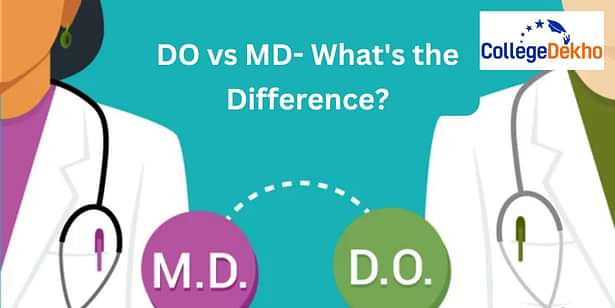
DOs vs MDs: Among DOs vs MDs the major difference is that DOs focus on overall patient health while the MDs have a focused approach towards treatment. The DOs specifically focus on the well-being of mind, body and mental health during treatment while MDs focus on the disease area and not the overall patient care. MD course uses allopathic medication technologies which include surgeries, drugs, X-rays etc while the DOs use holistic treatment to treat patients. MD use a system of physical manipulations & adjustments to diagnose & treat patients. On the other hand, MDs are broad practitioners who have a limited focus on physical manipulation techniques. In this article, find out in detail the differences between DOs and MDs.
DOs vs MDs- Overall Differences
DOs focus on allopathic treatment while MDs focus on mind, body and mental health while treating a patient. Students can find the major differences between DOs and MDs given below.
Particulars | MD (Doctor of Medicine) | DO (Doctor of Osteopathic Medicine) |
|---|---|---|
Treatment Style | MD doctors use allopathic medicine focusing on diagnosing and treating specific symptoms. | DO doctors use Osteopathic medication while emphasizing a holistic approach to health |
Training | MD doctors have a training of 2 to 3 years based on their specialization. They become specialised doctors after their course. | DO doctors go through 4 years of training and then they get a residency permit. They can also do a specialisation during their training and become specialized DO doctors. |
Approach to Treatment | MD doctors have a more targeted approach. They often use conventional methods like surgery and prescriptions. | DO doctors have a holistic approach to treatments. They consider the patient’s overall body including, mind, body and mental health. They weigh the pros and cons of the medication and consider the overall health of the patients which later results in lifestyle changes as well. |
Manipulative Techniques | MD doctors have limited focus on physical manipulation. They primarily use conventional medical practices. | DO doctors go through extensive training of approximately 200 hours in osteopathic manipulative medicine (OMM). |
Medication Focus Areas | MD often focuses on specific conditions or symptoms. | DO often focuses on ways different systems interact and influence the overall health of a patient. |
Technology/Medication Specialities | MD doctors use medication methods like Surgery, psychiatry, paediatrics, geriatrics, etc. | DO doctors use methods like family medicine, internal medicine, and paediatrics etc. They also consider the atmosphere surrounding the patient for better mental health. |
Entrance Exams | Students must pass the NEET PG exam to be MD doctors. | Students must pass the AIAPGET exam to be DO doctors. |
What is a DO?
DO stands for the doctor of Osteopathic Medicine. In comparison with MDs, DOs use the same conventional medical techniques as MDs but with a few other methods and studies. DOs tend to focus more on holistic health and the prevention of any specific disease. In a holistic health approach, all parts of a person, including their mind, body, and emotions, are considered during the treatment procedure. The DOs also use a system of physical adjustments and techniques to diagnose and treat people with utmost care. More than half of DOs work in primary care centres to provide basic support, but they can also specialize and carry out the treatment process in another field, just like MDs.
What is MD?
The full form of MD is a doctor of medicine. MDs are considered as ‘allopathic doctors’. That means they treat and diagnose the disease using conventional medical tools like X-rays, and prescription drugs, and conduct surgeries. The allopathic medicine is also known as conventional or mainstream medicine. The MDs can choose to be full-time practitioners and work as caregivers of family medicine or primary care doctors. They can also gain specialization in several areas, which require higher education. Various specializations for MD courses are:
- Surgery
- Specific body parts or organs
- Psychiatry
- Geriatric medicine
- Paediatrics
DOs vs MDs: Eligibility Criteria
Students must have a bachelor's degree to study DO courses while for MD courses students must have an MBBS degree from a recognised university. Students can find the DOs vs MDs difference between the eligibility criteria given below.
Particulars | MD (Doctor of Medicine) | DO (Doctor of Osteopathic Medicine) |
|---|---|---|
Minimum Eligibiility Criteria | Students to study MD courses must possess an MBBS degree from a recognized institution. | Students to study Doctor of Osteopathic Medicine must possess a bachelor's degree from an accredited institution. |
Minimum Marks in Bachelor's Degree | Students must secure at least a minimum of 50% to study MD courses in India. | Students to study DO courses must have at least 80% marks in their bachelor's degree. |
Internship Experience | Students must have an MBBS degree from a recognised university. | Students with clinical experience will be preferred during the admission process. |
Prerequisite Coursework | Students must have subjects like anatomy, physiology, and biochemistry during their MBBS course. | Students must have a C grade or more in subjects like physics, chemistry, biology and biochemistry. |
Letters of Recommendation | Students must have a letter of recommendation from the last institution as some colleges will require it during the personal interviews. | Students must have two letters of recommendation. They must have one from a pre-medical advisor and one from a physician (DO or MD) to study DO courses. |
Experience in Healthcare | Students with Clinical exposure through internships and volunteer work will be preferred. | Students wanting to study DO courses must have some work experience. |
Age Limit | NO age limit is required to study MD courses. | Students must be at least 18 years old to study Doctor of Osteopathic Medicine courses. |
DO vs MD- Training Procedure
As per the study is concerned, both DOs and MDs learn how to diagnose, treat, and prevent diseases and treat injuries. As a consequence, they receive much of the same training course. The training course for DO vs MD includes the following:
- 4 years of medical school after earning a bachelor’s degree
- 1 year as an intern before starting a residency or practising as a resident doctor
- A residency program lasting up to 7 years of term
The DO study focuses on a whole-body approach of the patients. This means the body is considered as one interconnected self-sustaining and self-healing unit of a human. Part of the DO’s job is to help individuals in taking care of themselves. This is done by understanding the optimal body structure, function, and healing process. As such, DO courses may focus more on preventive medicine and care. Preventive care is a big part of a DO’s study curriculum and practice. The care can be as promoting fitness and a healthy diet or could also involve using medications, an example being HIV prevention. While DOs do focus mostly on preventive care, preventive medicine is still covered in allopathic medical schools and practised by MDs in practice.
Read More:
DO Exam Pattern
Exam Pattern of Dos vs MDs
As per the curriculum, both DOs and MDs must pass a national test before becoming licensed to practice medicine. MDs must pass the United States Medical Licensing Examination (USMLE). And, DOs must take the Comprehensive Medical Licensing Examination (COMLEX).
In addition to taking the COMLEX, some DOs may also prefer to take the USMLE as well. The primary reason that they may choose to opt for this exam is to help them stand out when applying for a residency to practice individually.
DOs vs MDs: Career Prospects
In terms of career prospects among DOs vs MDs, MDs focus on working in urban and specialised areas while DOs focus more on working in rural areas. Students can find the difference between the career prospects among DOs and MDs given below.
Career Aspect | MD (Doctor of Medicine) | DO (Doctor of Osteopathic Medicine) |
|---|---|---|
Job Outlook | In the past 10 years, there has been a 3% increase in demand for MD doctors. | In past years, there has been 44.8% job growth in Doctor of Osteopathic Medicine. |
Specialization | MD doctors work more in the specialized medical sectors. | DO doctors work in primary care specialities. |
Average Salary | MD doctors entry level salary ranges from Rs. 12.5 LPA to Rs. 18.4 LPA annually. | DO programs are not offered in India and the annual salary ranges from Rs. 1 crore to Rs. 1.36 crore. |
Practice Settings | MD Doctors mostly work in urban areas. | DO Doctors usually work in rural or underserved areas, often in primary care. |
Recognition | MDs are widely recognized globally and the qualifications are accepted in most countries. | DO Doctors are widely recognised internationally. |
Career Flexibility | The job offers highly flexible careers | The job opportunities are more flexible towards primary care. |
DO vs MD- Which is Better?
There’s no correct answer to choosing between an MD or DO course. Both are equally qualified for the candidates to understand and carry out the professional journey. If the candidate is looking to be a more hands-on doctor who might be more open to holistic or alternative treatment options, they must consider seeking a DO course. Most doctors are still MDs. As per the statistics, there has been an 81% increase in the total number of DOs and osteopathic medical students over the past decade. Primary care is still the most common area of focus for both MDs and DOs. This primary care area includes the following areas:
- Internal medicine
- Family medicine and general practice
- Paediatrics
- Emergency medicine
- Surgery
- Obstetrics and gynecology
- Psychiatry
- Anesthesiology
Are you feeling lost and unsure about what career path to take after completing 12th standard?
Say goodbye to confusion and hello to a bright future!

FAQs
The qualifying exam for MD and DO is almost similar. Both courses depend on undergraduate grade point averages (GPAs) and the Medical College Admission Test.
The earning potential depends on the position and practice of a surgeon as well as of physicians. Whether they are practicing in the hospital or individually, the salary depends on both.
While studying, the MDs are given adequate knowledge and training to perform surgery on the patients. Most surgeons have an MD degree in India as well as abroad.
Was this article helpful?


















Similar Articles
List of Colleges for NEET AIQ Rank 1,00,000 to 3,00,000
List of Colleges for NEET AIQ Rank 25,000 to 50,000
List of Colleges for NEET 2025 AIQ Rank 75,000 to 1,00,000
List of Colleges for NEET AIQ Rank 50,000 to 75,000
Expected NEET 2025 Cutoff for Meghalaya - AIQ and State Quota Seats
Most Repeated Questions in NEET Biology